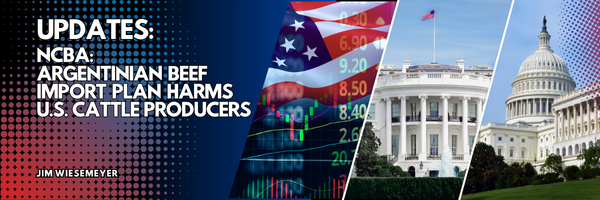
NCBA: Argentinian Beef Import Plan Harms U.S. Cattle Producers
Cattle group warns Trump proposal could undercut American ranchers and risk livestock health
The National Cattlemen’s Beef Association (NCBA) sharply criticized President Donald Trump’s suggestion that importing beef from Argentina could help lower U.S. meat prices, warning that such a move would harm domestic cattle producers and distort market dynamics.
“NCBA’s family farmers and ranchers have numerous concerns with importing more Argentinian beef to lower prices for consumers,” said NCBA CEO Colin Woodall. “This plan only creates chaos at a critical time of the year for American cattle producers, while doing nothing to lower grocery store prices.”
The NCBA highlighted the imbalance in trade between the two nations — noting Argentina has exported over $801 million in beef to the U.S. over the past five years, while the U.S. has sold just $7 million worth to Argentina. The group also flagged Argentina’s “history of foot-and-mouth disease,” cautioning that an outbreak in the U.S. “could decimate our domestic livestock production.”
While acknowledging higher beef prices, the association emphasized that strong consumer demand reflects the quality and safety improvements made by U.S. producers. The NCBA urged the White House and Congress to “let the market work,” warning that government interventions risk doing “nothing but harm rural America.”
President Trump said the U.S. may import beef from Argentina to help cool record meat prices, but the modest scope of potential shipments means relief for consumers could be limited. As we previously reported (link), speaking aboard Air Force One on Sunday, Trump said the move would “bring our beef prices down” and strengthen ties with “a very good ally.” However, he clarified that any purchases would be small.
Argentina currently accounts for only about 2% of U.S. beef imports, far behind major suppliers such as Brazil, Australia, Canada, and New Zealand. Between January and July, Argentina shipped roughly 33,000 metric tons of beef to the U.S., compared with Brazil’s 367,000 metric tons. The U.S. buys Argentine beef under a 20,000-ton tariff-rate quota; imports beyond that face a 26.4% duty.
U.S. beef prices have surged to record highs as domestic cattle supplies tighten and a 40% tariff on Brazilian beef further constrains imports. Mario Ravettino, head of Argentina’s meat exporters’ consortium, said there is “nothing set in stone” regarding a new deal.
Despite Argentina’s own economic turmoil and declining domestic beef consumption, it remains one of the world’s top red-meat consumers per capita.
Argentina’s central bank and the U.S. Treasury signed the $20 billion currency swap line, part of a rescue effort led by Treasury Secretary Scott Bessent to stabilize President Javier Milei’s fragile economy ahead of crucial Oct. 26 midterms. The move — complemented by recent U.S. purchases of Argentine pesos and a forthcoming private-sector credit facility of similar size — briefly lifted Argentine bonds before they erased gains, while the peso weakened 2.1% to 1,481 per dollar. The agreement’s details remain undisclosed, leaving investors uncertain about implementation timing or concessions beyond Argentina’s fiscal-austerity pledges. Former Treasury Secretary Lawrence Summers warned the unilateral U.S. intervention lacked IMF-style safeguards and could heighten financial risk.
Markets remain volatile as inflation surges and growth contracts, while Milei’s libertarian coalition struggles to expand its minimal congressional footprint amid corruption scandals and voter backlash over subsidy cuts. Trump, who hosted Milei last week, defended the aid as a lifeline for “a country fighting to survive.” Analysts say confirmation that the swap is already active will be key to keeping the peso from breaching its ARS 1,490 band limit.
| Jim Wiesemeyer | 43001 Vestry Court, Broadlands, VA 20148UnsubscribeUpdate Profile | Constant Contact Data NoticeSent by wiesemeyer@gmail.com powered by |


